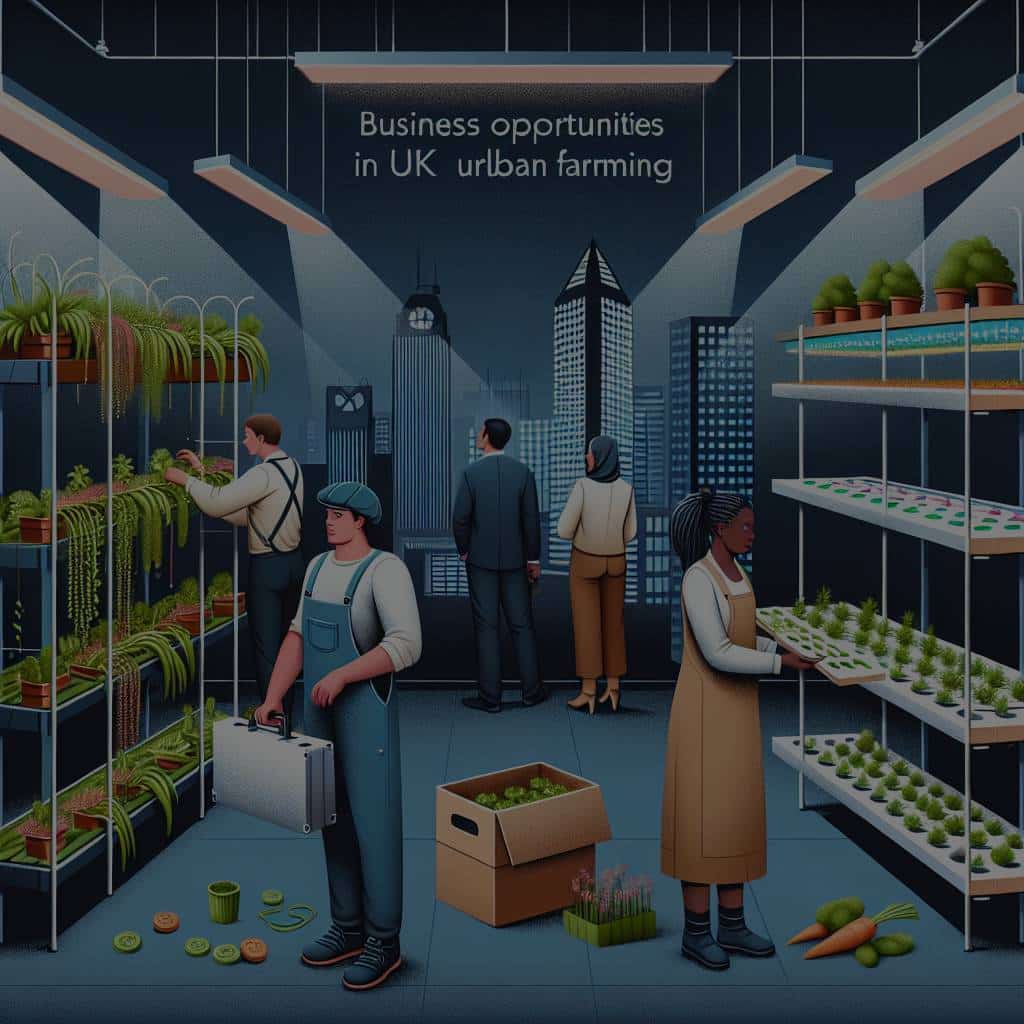What Are the Business Opportunities in UK Urban Farming Technologies?

Urban farming – a term that may have seemed inconceivable a decade ago – is now an integral part of the UK’s agriculture landscape. As ‘farm to fork’ becomes a mantra for the conscious consumer, urban farming technologies such as vertical farming and hydroponics are rapidly gaining traction. Underpinning this shift is a growing desire for fresh, local produce, and a need for sustainable, efficient farming methods.
This article will delve into the business opportunities emerging in the UK’s urban farming sector. We’ll discuss the technology driving this industry, the benefits of urban farming, and how budding entrepreneurs can start a business in this space.
Sujet a lire : What Are the Best Practices for Lead Generation in UK B2B Markets?
The Rise of Vertical Farming in the UK
Vertical farming is at the crux of urban agriculture. By growing crops in vertically stacked layers, it makes farming possible in urban centres where land is scarce. In these vertical farms, crops grow under LED lights, without soil, and with very little water.
The business opportunities in vertical farming are endless, especially in cities with high population densities. Vertical farming offers a practical solution for feeding urban populations, reducing the need for long-distance food transportation and the associated carbon footprint. It also promises higher crop yields compared to traditional agriculture, which means businesses can generate more revenue from smaller spaces.
Cela peut vous intéresser : How Can Small UK Law Firms Establish a Competitive Online Presence?
In the UK, vertical farming is a rapidly growing business area. Companies like Jones Food Company are setting up high-tech vertical farms to grow herbs, salad greens, and other crops. They sell their produce to supermarkets and restaurants, tapping into the local market’s demand for fresh, local food.
The technology required for vertical farming, such as LED lighting, climate control systems, and hydroponic or aeroponic growing systems, presents another business opportunity. Companies that can provide these technologies have a significant role in the expansion of this market.
Starting an Urban Farming Business
Starting an urban farming business in the UK can be a rewarding venture. This doesn’t necessarily require vast capital investment or extensive farming knowledge. With the right planning, resources and a good understanding of local market needs, you can build a successful urban farm.
The first step is to identify what crops you plan to grow. This will determine the specific technologies and systems your farm will need. Consider crops that thrive in controlled environments and have a high market demand.
The next step is to secure a location. This could be a rooftop, a disused warehouse, or even a shipping container. It’s crucial to consider the costs and logistics involved in setting up and running your urban farm.
Then, consider the technology you’ll need. Depending on your chosen farming method (hydroponics, aeroponics, or aquaponics), you may need different types of equipment. You’ll also need to think about the systems for climate control, lighting, and plant nutrition.
Lastly, build relationships with local retailers, restaurants, and farmers’ markets. These will be your main outlets for selling your produce.
The Community Impact of Urban Farming
Urban farming can have a profound impact on local communities. It can create jobs, reduce food miles, and increase access to fresh, healthy food.
Regenerating unused or underutilised urban spaces into thriving farms can boost local economies. These farms can provide jobs, offering opportunities for people to learn new skills, and contribute to the local economy.
Moreover, urban farming can help reduce food miles and the associated carbon emissions. By growing food in the heart of the city, produce can travel a shorter distance from farm to consumer. This not only reduces the environmental impact, but also ensures the produce is as fresh as possible.
The Role of Technology in Urban Farming
Technology plays a pivotal role in making urban farming efficient and sustainable. From advanced lighting systems to soil-less growing methods, technology is transforming the way we farm in urban environments.
In vertical farms, LED lights are used to provide the optimal light spectrum for plant growth. These lights are energy-efficient and can be tailored to the specific needs of different crops.
Soil-less growing methods, such as hydroponics and aeroponics, are also key technologies in urban farming. These methods allow crops to receive precise amounts of nutrients and water, improving growth rates and reducing resource usage.
Automated systems for monitoring and controlling the growing environment are another crucial technology. These systems can adjust lighting, temperature, and nutrient levels based on real-time data, ensuring the best growing conditions for the crops.
Looking forward, technologies like artificial intelligence (AI) and machine learning could further revolutionise urban farming. They could be used to analyse data from the farm, predict crop yields, and optimise growing conditions.
In conclusion, the UK’s urban farming sector presents numerous business opportunities. Whether it’s setting up a vertical farm, providing technology solutions, or contributing to community development, there are countless ways to get involved in this burgeoning industry.
The Potential of Hydroponics in Urban Farming
Hydroponics, another efficient form of urban farming, involves growing plants in a water-based, nutrient-rich solution without using soil. This method of farming has tremendous potential for commercial exploitation in the UK, especially when combined with the vertical farming technique.
Hydroponics is particularly suited to urban areas where arable land is scarce or nonexistent. It offers an innovative method of food production, allowing urban farmers to cultivate a wide variety of crops, including leafy greens and herbs, in confined spaces such as rooftops, basements, or even old shipping containers.
There’s ample scope for setting up a hydroponics business in the UK, especially in densely populated cities where the demand for fresh, locally-sourced produce is high. Moreover, hydroponic systems can be set up and managed by those with little to no agricultural background, making it an accessible business option for many.
The hydroponics market in the UK also offers opportunities for providers of necessary technology and equipment. High tech systems that monitor and control water nutrient levels, pH levels, and lighting can be in high demand. This demand is set to grow as more and more people realise the potential of hydroponics in urban farming.
Urban Farming’s Impact on Food Security
Food security is a major concern, particularly in urban areas where the gap between production and consumption is often significant. Here, urban farming, with its promise of large scale, local food production, has the potential to make a substantial difference.
Urban farms can contribute significantly to food security by providing a steady supply of fresh produce throughout the year, regardless of seasonal changes. The ability to control growing conditions allows urban farmers to ensure a consistent yield, reducing dependence on external factors and potential disruptions to supply chains.
Moreover, urban farming can contribute to dietary diversity by enabling the cultivation of a wider variety of crops, including fruits, vegetables, and herbs. This can lead to healthier, more balanced diets for urban populations.
As urban farming scales up, it has the potential to significantly reduce the UK’s food imports, thus strengthening domestic food security. In addition, the sustainability of urban farming technologies such as vertical farming and hydroponics contributes to long-term food security by reducing the environmental impact of food production.
Conclusion
In conclusion, the urban farming sector in the UK is ripe with opportunities. The potential of vertical farming and hydroponics in densely populated urban areas is enormous, and the demand for fresh, locally-sourced produce is growing. Businesses that can supply the necessary technology for these high-tech farming systems stand to benefit greatly.
Furthermore, urban farming can have a significant positive impact on local communities, from providing employment opportunities to boosting food security. In addition, by reducing food miles and promoting large scale, local food production, urban farming contributes to sustainability and supports the UK’s environmental goals.
Whether you’re an entrepreneur looking to start a new venture, a tech company with a focus on agriculture, or a community leader aiming to improve local food security, the urban farming sector in the UK offers a fertile ground for growth and innovation. The rise of indoor farming technologies like vertical farms and hydroponics, coupled with an ever-increasing demand for fresh, local produce, makes the future of urban farming in the UK look promising indeed.
